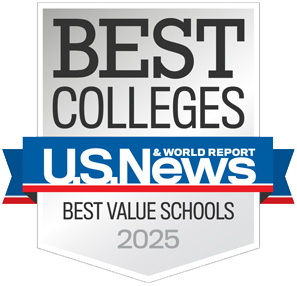Geosciences
Geoscience is the scientific study of the earth — including how it has functioned and changed over time.
With a deep understanding of the planet and its life forms, well-trained geoscientists can help organizations create environmentally and economically viable plans into the future.
Study within a geologically unique region
You’ll spend time outdoors as a geosciences major, applying what you’ve learned in the classroom to some of Southern California’s unique geological features. You’ll also learn important laboratory techniques in our newly renovated classrooms and labs.
Learn geoscience subdisciplines
Your courses will familiarize you with current developments and techniques within various geosciences subdisciplines. Areas of study include paleontology, climate change, geologic hazards, water resources, field methods, soils, sedimentology and more.
You’ll also work closely with other related disciplines — environmental science, chemistry, physics, biology, mathematics, and geography — as you expand your knowledge of how the earth works, analyze natural resources and geologic hazards and mitigate human impact on our environment.
Participate in earth sciences research
Doing research in a field you are passionate about gives you valuable and relevant experience for your future career. Prior student research projects have included:
- A study of the shell preservation of microfossils, relating ocean chemistry to warming-cooling periods of the past by a student who now works as an environmental geologist.
- A study of the Miocene Ricardo Formation in Red Rock Canyon State Park by a student who now works as an exploration geologist for Exxon/Mobil.
- A study of the vertebral column of the beaked whale Mesoplodon europaeus by a student who is now pursuing a Ph.D. in vertebrate paleontology at the University of Michigan.
At a Glance

Degree Type
Bachelor of Science
Department
Earth and Environmental Sciences Department
School/College
College of Arts and Sciences
Next Steps
Interested in this major? Here's what you can do next:
With challenging and relevant courses, outstanding faculty, small class sizes, and an emphasis on hands-on learning, the geosciences program will position you to succeed in your chosen career.
Degree requirements
Find out what it takes to earn a degree in geosciences and explore the courses.
Highlighted Courses
Get familiar with some of the courses you might take in this major.
EES 305: Climate Change
This course investigates how contemporary/anthropogenic climate change compares to climate variations over Earth's long history, including our scientific understanding of its causes and its local and global impacts. An overview of the physical components of Earth's climate system is discussed. The course includes both lecture and laboratory experiences.
Read descriptionEES 331: Paleontology
A survey of the study of ancient life as revealed in the fossil record. Lecture stresses evolutionary theory and the history of life; lab surveys major invertebrate fossil taxa with emphasis on taxonomy and functional morphology.
Read descriptionEES 395: Water Resources
An introduction to the principles of surface and groundwater hydrology and to problems related to water utilization. Includes water distribution and availability, alternatives for increasing future water supply, water pollution and mitigation, and water rights law.
Read descriptionEES 310: Natural Hazards and Disasters
This course focuses on global geographies of natural hazards and disasters, with an emphasis on geographic disparities in societal preparedness, resilience, and recovery. This course investigates the geophysical and meteorological phenomena that are the root causes of natural disasters, as well as the social institutions and human geographies that exacerbate them.
Read descriptionEES 390: Introduction to Soils
Soil Science encompasses a broad spectrum of integrated sciences that include biology, chemistry, earth/geological sciences, physics, horticulture and ecology. Lectures will introduce you to many of the subdivisions of soil science that include: agriculture and nutrient management, soil formation and pedology, soil classifications, soil biology, soil physics and soil chemistry.
Read descriptionEES 485: Environmental Science Capstone
This course introduces students to the professional skills and practices required in the environmental field. Includes introduction to GIS (Geographic Information Systems), literature searches, written and oral presentation of work.
Read descriptionView all courses in Earth and Environmental Sciences
Recommended Minors
Want to add even more value to your degree? Consider one of these minors to gain a unique combination of skills and perspectives.
We offer hands-on opportunities that give you the freedom to explore your passion through real-world work and prepare for a fulfilling career.
-
Learning in Action
We emphasize “doing” science and an active approach to learning. Throughout your classes, you’ll gain a lot of research experience by working side-by-side with your professors in state-of-the-art facilities. You’ll design experiments, collect scientific data, perform statistical analysis and share your conclusions through research papers and presentations.
-
Conference Presentations
Many of our students have the opportunity to perform independent research with faculty advisors on campus and present their findings at research consortiums, such as our annual Festival of Scholars or off-campus conferences.
-
Field Work
You’ll spend time outdoors as a geosciences major, applying what you’ve learned in the classroom to some of Southern California’s unique geological features. You’ll also learn important laboratory techniques in our newly renovated classrooms and labs.
-
STEM Living-Learning Community
Located in Conejo Hall, this program allows residential students in STEM majors to more frequently interact with peers and faculty members in their discipline, enabling them to easily form study groups. Additionally, STEM-focused programming provided by Residence Life staff and faculty members allows for integrated learning between the classroom and residence hall. Learn more
-
Earth Society
Earth Society creates a community of students who are dedicated to making a difference for our planet. Members dive into environmental issues through hands-on experiences, from beach cleanups, hikes, sustainability projects, outreach, and more. See club details.

Geology can be challenging at times with the various course requirements, but in the end, it’s worth it for the overall experience. The geoscience community is also very open and welcoming at Cal Lutheran and outside.
Cameron Fetter '25
Read their storyIn both the public and private sectors, geoscientists are hired to study groundwater pollution, earthquake hazards, landslides, and mining or petroleum resources. Along with being accepted into graduate schools around the country, many geoscience students from Cal Lutheran have entered careers in environmental geology, geophysics, environmental cleanup and response, and education.
Potential Careers
Geological Technicians
Assist scientists or engineers in the use of electronic, sonic, or nuclear measuring instruments in laboratory, exploration, and production activities to obtain data indicating resources such as metallic ore, minerals, gas, coal, or petroleum. Analyze mud and drill cuttings. Chart pressure, temperature, and other characteristics of wells or bore holes.
Read descriptionClimate Change Policy Analysts
Research and analyze policy developments related to climate change. Make climate-related recommendations for actions such as legislation, awareness campaigns, or fundraising approaches.
Read descriptionGeoscientists
Study the composition, structure, and other physical aspects of the Earth. May use geological, physics, and mathematics knowledge in exploration for oil, gas, minerals, or underground water; or in waste disposal, land reclamation, or other environmental problems. May study the Earth's internal composition, atmospheres, and oceans, and its magnetic, electrical, and gravitational forces. Includes mineralogists, paleontologists, stratigraphers, geodesists, and seismologists.
Read descriptionHydrologists
Research the distribution, circulation, and physical properties of underground and surface waters; and study the form and intensity of precipitation and its rate of infiltration into the soil, movement through the earth, and return to the ocean and atmosphere.
Read descriptionSoil and Plant Scientists
Conduct research in breeding, physiology, production, yield, and management of crops and agricultural plants or trees, shrubs, and nursery stock, their growth in soils, and control of pests; or study the chemical, physical, biological, and mineralogical composition of soils as they relate to plant or crop growth. May classify and map soils and investigate effects of alternative practices on soil and crop productivity.
Read descriptionPark Naturalists
Plan, develop, and conduct programs to inform public of historical, natural, and scientific features of national, state, or local park.
Read descriptionGeographic Information Systems Technologists and Technicians
Assist scientists or related professionals in building, maintaining, modifying, or using geographic information systems (GIS) databases. May also perform some custom application development or provide user support.
Read descriptionEnvironmental Compliance Inspectors
Inspect and investigate sources of pollution to protect the public and environment and ensure conformance with Federal, State, and local regulations and ordinances.
Read descriptionEmployers
Some of the organizations our graduates work for include:
- Arcadis
- California State Parks
- Cardno ERI
- Cliff Berry Inc.
- Dala Pertroleum
- Exxon-Mobil
- Fugro West, Inc.
- Geolabs-Westlake Village
- Grover-Hollingsworth & Associates, Inc.
- Petrolog
- Southern California Soil and Testing, Inc.
- Trey Resources, Inc.
- U.S. Bureau of Ocean Energy Management
Graduate Schools
Our alumni have pursued advanced degrees at:
- California State University, Northridge
- Northern Arizona University
- Stanford University
- Texas A & M
- University of Michigan
- University of Nevada, Las Vegas
- University of Notre Dame
- University of Southern California
- University of Texas of the Permian Basin
- University of Wisconsin, Madison

My major provided me with a lot of opportunities to beef up my resume. It really made me stand out when looking for a job. My most useful skill I learned was time management and meeting deadlines. As a Geologist for an environmental consultant company, meeting deadlines for reports is very important to keep clients happy.
Madison Karcich '22
Read their storyThis page includes information from O*NET OnLine by the U.S. Department of Labor, Employment and Training Administration (USDOL/ETA). Used under the CC BY 4.0 license. Some occupations listed above may require a related graduate degree.
How We Prepare You for Success
We have 20,000+ employer contacts for jobs and internships, with over 200 listings posted each week.
Our excellent career counselors in the Career Services center will get in touch with you during your very first term on campus. They offer over 50 workshops each year on resume writing, interviewing, salary negotiations, applying to graduate schools, and other critical skills to help you begin your career successfully.
After you graduate from Cal Lutheran, you receive free access to Career Services for life, as a valued member of our alumni family.
of Cal Lutheran graduates find a job or enroll in graduate school within nine months
We work with students and families to make sure everyone who is admitted to Cal Lutheran can afford it.
Tuition & Fees
You and your family might have questions about how you’ll cover the costs of college. We can tell you this — it costs less than you think.
Scholarships & Grants
We offer a range of awards based on academic merit and financial need. This is money that does not need to be repaid.
Net Price Calculator
Take a few minutes to use our calculator and get yourself a personalized estimate of your costs and financial aid.
Let us know and we'll send you information about our academics, campus life, the admission process, and more!
Ready to apply?
We’re now accepting applications for Fall 2026!
Level Up Your College Search
Check out our college success guides to help you navigate the search process.

How to Choose a College Major
Your major will be a significant part of your academic experience. How do you pick the right one?

5 Tips for Applying to College
Learn how to look good when applying to colleges, with personal tips to stand out from Cal Lutheran admission counselors.

How to Afford College
Read this guide to minimize costs as you save for college during high school — learn all about scholarships, financial aid, FAFSA, and more!

5 Key Advantages of a Liberal Arts Education
Are the liberal arts still worth studying in today's world? If you want a future-proof college education — absolutely.

How to Get Recruited for College Athletics
Check out our tips to connect with coaches, navigate campus visits, and move forward with confidence.

Private vs. Public Universities
The differences between each — and how to choose the school with your dream college experience.
